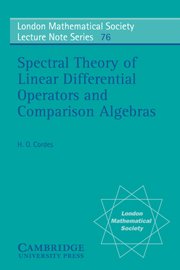Book contents
- Frontmatter
- Preface
- Contents
- Dedication
- Chapter 1 Abstract spectral theory in Hilbert spaces
- Chapter 2 Spectral theory of differential operators
- Chapter 3 Second order elliptic expressions on manifolds
- Chapter 4 Essential self-adjointness of the Minimal Operator
- Chapter 5 C*-Comparison algebras
- Chapter 6 Minimal comparison algebra and wave front space
- Chapter 7 The secondary symbol space
- Chapter 8 Comparison algebras with non-compact commutators
- Chapter 9 Hs-Algebras; higher order operators within reach
- Chapter 10 Fredholm theory in comparison algebras
- Appendix A Auxiliary results concerning functions on manifolds
- Appendix B Covariant derivatives and curvature
- Appendix C Summary of the conditions (xj) used
- List of symbols used
- References
- Index
Chapter 4 - Essential self-adjointness of the Minimal Operator
Published online by Cambridge University Press: 22 March 2010
- Frontmatter
- Preface
- Contents
- Dedication
- Chapter 1 Abstract spectral theory in Hilbert spaces
- Chapter 2 Spectral theory of differential operators
- Chapter 3 Second order elliptic expressions on manifolds
- Chapter 4 Essential self-adjointness of the Minimal Operator
- Chapter 5 C*-Comparison algebras
- Chapter 6 Minimal comparison algebra and wave front space
- Chapter 7 The secondary symbol space
- Chapter 8 Comparison algebras with non-compact commutators
- Chapter 9 Hs-Algebras; higher order operators within reach
- Chapter 10 Fredholm theory in comparison algebras
- Appendix A Auxiliary results concerning functions on manifolds
- Appendix B Covariant derivatives and curvature
- Appendix C Summary of the conditions (xj) used
- List of symbols used
- References
- Index
Summary
In this section we will discuss a variety of criteria, all establishing essential self-adjointness of the minimal operator H0, for an expression H of the form III,(0.1), or one of its powers. In other words, we seek to establish the definite case, in the language of Carleman. This is a classical subject, with a large list of contributions, too numerous to be discussed in detail (cf. the bibliography in [F1]).
Our selection, below, is guided by the requirements in chapter's 5f. In particular we only consider the case of an expression H bounded below.
All proofs offered are elementary. However we will require the statement of Weyl's lemma for expressions H as well as for their powers Hm, m=1,2,…. While the first was discussed in III,1, the corresponding property for powers can be easily derived with the same proof, using the explicit Green's function we have established for the operators H. Clearly Hm has the m-th iterate of the integral kernel g(x, y) as its Green's function, and one easily analyzes the character of its singularity. Then the proof of III, thm.1.2 may be repeated.
Actually, the latter argument is not required if distribution calculus is used: It is a trivial fact that products of of hypo-elliptic operators are hypo-elliptic again. The proof of III, thm.1.2 is easily rewritten to show that the expression H there is hypo-elliptic. Hence Hm, for m = 1,2,3,…, all all must be hypo-elliptic.
- Type
- Chapter
- Information
- Publisher: Cambridge University PressPrint publication year: 1987



